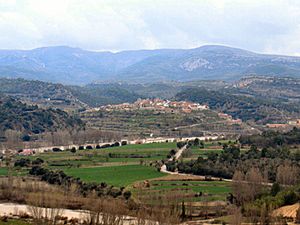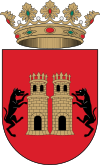Zorita del Maestrazgo facts for kids
Quick facts for kids
Zorita del Maestrazgo
|
|||
|---|---|---|---|
|
Municipality and town
|
|||
 |
|||
|
|||
| Country | Spain | ||
| Autonomous community | |||
| Province | |||
| Comarca | Ports | ||
| Area | |||
| • Total | 68.8 km2 (26.6 sq mi) | ||
| Elevation | 661 m (2,169 ft) | ||
| Population
(2018)
|
|||
| • Total | 112 | ||
| • Density | 1.628/km2 (4.216/sq mi) | ||
| Time zone | UTC+1 (CET) | ||
| • Summer (DST) | UTC+2 (CEST) | ||
| Postal code |
12311
|
||
| Website | http://www.zoritadelmaestrazgo.es | ||
Zorita del Maestrazgo (which is called Sorita in Valencian) is a small town and a municipality in Spain. It is located in the province of Castellón, which is part of the Valencian Community. This charming place is known for its beautiful natural surroundings and its rich history.
Contents
About Zorita del Maestrazgo
Zorita del Maestrazgo is a very small town. In 2018, only about 112 people lived there. It covers an area of about 68.8 square kilometers. The town is located at an elevation of 661 meters above sea level. This means it is quite high up, offering great views of the surrounding landscape.
Where is Zorita?
Zorita del Maestrazgo is found in the eastern part of Spain. It is in the northern area of the Valencian Community. The town is part of a region called Ports. This area is known for its mountains and valleys.
What is a Municipality?
A municipality is like a local government area. It includes a town or city and the land around it. Zorita del Maestrazgo is a municipality, meaning it has its own local council. This council helps manage things like local services and public spaces for the people who live there.
History of Zorita
Zorita del Maestrazgo has a long and interesting history. The name "Maestrazgo" comes from a time when powerful knight orders, like the Knights Templar, owned much of the land. These knights played a big role in the history of this region.
Ancient Times
People have lived in this area for a very long time. There is evidence of settlements from ancient times. The location was important because it was easy to defend.
Medieval Period
During the Middle Ages, Zorita was part of the Kingdom of Aragon. It was a strategic point due to its location. The town grew around its castle and church. Many of the old buildings you can see today are from this period.
Geography and Nature
The area around Zorita del Maestrazgo is very beautiful. It has a mix of mountains, forests, and valleys. This makes it a great place for nature lovers.
Local Climate
Zorita has a Mediterranean climate, but because it's high up, the summers are not too hot. Winters can be cool. This climate supports a variety of plants and animals.
Natural Surroundings
The landscape is rugged and green. You can find many types of trees, like pines and oaks. There are also many different kinds of wild flowers. The clean air and quiet surroundings make it a peaceful place.
What to See in Zorita
Even though it's a small town, Zorita del Maestrazgo has some interesting places to visit. These sites show its history and culture.
The Sanctuary of the Balma
One of the most famous places near Zorita is the Santuario de la Balma. This is a special church built into a cave or rock overhang. It's a very unique and impressive sight. Many people visit it every year.
Old Town Center
The old part of Zorita del Maestrazgo has narrow streets and traditional houses. Walking through them feels like stepping back in time. You can see how people lived many years ago.
Local Church
Like many Spanish towns, Zorita has a main church. It is usually a central part of the community. These churches often have beautiful old artwork and architecture.
Local Life and Culture
Life in Zorita del Maestrazgo is calm and traditional. The people here keep many old customs alive.
Festivals and Traditions
Local festivals are an important part of life. They often celebrate religious holidays or harvest times. These events bring the community together with music, food, and dancing.
Local Food
The food in this region is typical of the Valencian Community. It often includes fresh local produce. You might find traditional stews, cured meats, and delicious pastries.
Images for kids
See also
 In Spanish: Zorita del Maestrazgo para niños
In Spanish: Zorita del Maestrazgo para niños
 | Frances Mary Albrier |
 | Whitney Young |
 | Muhammad Ali |






